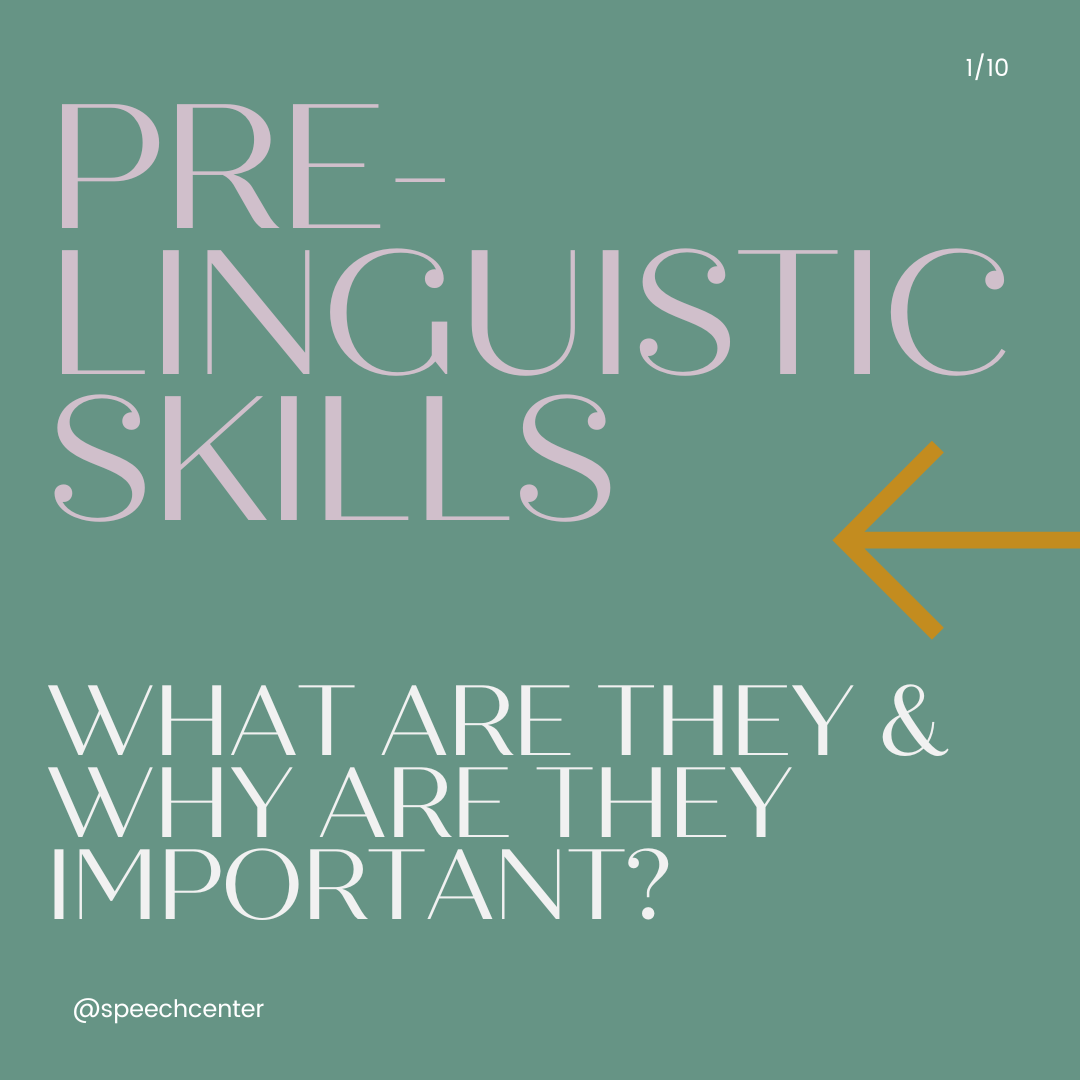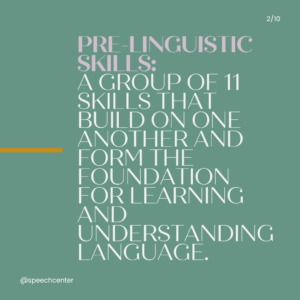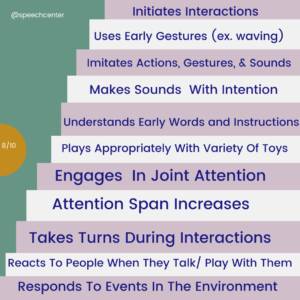
Pre-Linguistic Skills
The foundation for learning and understanding language.
Today on the blog we’ll be talking about pre-linguistic skills. More specifically, what they are and why they’re important. Let’s dive in!
Pre-linguistic skills: a group of eleven skills that build on one another and form the foundation for learning and understanding language. Try to visualize the skills as a staircase, with each skill building on the one before it. Okay, so what are the eleven skills?
𝗣𝗿𝗲-𝗟𝗶𝗻𝗴𝘂𝘀𝘁𝗶𝗰 𝗦𝗸𝗶𝗹𝗹𝘀:
1. 𝗥𝗲𝘀𝗽𝗼𝗻𝗱𝗶𝗻𝗴 𝘁𝗼 𝘁𝗵𝗲 𝗲𝗻𝘃𝗶𝗿𝗼𝗻𝗺𝗲𝗻𝘁
2. 𝗥𝗲𝘀𝗽𝗼𝗻𝗱𝗶𝗻𝗴 𝘁𝗼 𝗽𝗲𝗼𝗽𝗹𝗲
3. 𝗧𝘂𝗿𝗻 𝘁𝗮𝗸𝗶𝗻𝗴
4. 𝗗𝗲𝘃𝗲𝗹𝗼𝗽𝗶𝗻𝗴 𝗮 𝗹𝗼𝗻𝗴𝗲𝗿 𝗮𝘁𝘁𝗲𝗻𝘁𝗶𝗼𝗻 𝘀𝗽𝗮𝗻
5. 𝗝𝗼𝗶𝗻𝘁 𝗮𝘁𝘁𝗲𝗻𝘁𝗶𝗼𝗻
6. 𝗣𝗹𝗮𝘆𝘀 𝘄𝗶𝘁𝗵 𝗮 𝘃𝗮𝗿𝗶𝗲𝘁𝘆 𝗼𝗳 𝘁𝗼𝘆𝘀
7. 𝗨𝗻𝗱𝗲𝗿𝘀𝘁𝗮𝗻𝗱𝗶𝗻𝗴 𝘄𝗼𝗿𝗱𝘀 𝗮𝗻𝗱 𝗳𝗼𝗹𝗹𝗼𝘄𝗶𝗻𝗴 𝗱𝗶𝗿𝗲𝗰𝘁𝗶𝗼𝗻𝘀
8. 𝗩𝗼𝗰𝗮𝗹𝗶𝘇𝗶𝗻𝗴 𝗽𝘂𝗿𝗽𝗼𝘀𝗲𝗳𝘂𝗹𝗹𝘆
9. 𝗜𝗺𝗶𝘁𝗮𝘁𝗲𝘀
10. 𝗨𝘀𝗲𝘀 𝗴𝗲𝘀𝘁𝘂𝗿𝗲𝘀 𝘁𝗼 𝗰𝗼𝗺𝗺𝘂𝗻𝗶𝗰𝗮𝘁𝗲
11. 𝗜𝗻𝗶𝘁𝗶𝗮𝘁𝗲𝘀 𝗶𝗻𝘁𝗲𝗿𝗮𝗰𝘁𝗶𝗼𝗻𝘀 𝘄𝗶𝘁𝗵 𝗼𝘁𝗵𝗲𝗿𝘀
Now, let’s break down the eleven skills.
- Responding to the environment: the child consistently reacts to things he/she feels, hears and sees in his/her environment. The skill of responding is the foundation for communicating and interacting.
- Responding to people: the child consistently reacts to people and enjoys being around them. Communication requires two or more individuals, hence the importance of a child responding to people in their environment. If the child is not responding to other people, the interaction is one-sided.
- Turn taking: the child engages in an extended back and forth exchange with one or more individuals. Communication is a turn taking, or back and forth, exchange. It is literally how all of us become conversational and interactive.
- Developing a longer attention span: the child independently engages with an activity for five or more minutes. If an adult is present, the child engages with an activity for an even longer amount of time. Attention is the “golden ticket” to learning language, and honestly to learning ANYTHING new. Regardless of your age, if you’re not paying attention, you will not learn/ remember it.
- Joint attention: the child and communication partner coordinate attention to each other and to a third object or event. Through the use of joint attention children gain the ability to link meaning to your words, increase their vocabulary, make requests and maintain eye contact. Joint attention also demonstrates the beginning of the child understanding the mental representation of others.
- Plays with a variety of toys: the child plays with many toys appropriately and uses familiar objects in daily routines. Children learn almost everything through play.
- Understanding words and following directions: the child demonstrates understanding of early words and begins to follow simple single step directions. The child must understand words BEFORE he/she can use those words to communicate.
- Vocalizing purposefully: the child intentionally gets your attention by using his/her voice (he/she becomes noisy). The child needs to learn to intentionally produce sounds to eventually learn to talk.
- Imitates: the child imitates, or copies, what he/she hears and sees others do and speak. Children often imitate gross motor skills prior to imitating fine motor skills (talking is a fine motor skill). That being said, target imitation of actions, gestures, and beginning sounds long before you target imitation of words.
- Uses gestures to communicate: the child begins to communicate non-verbally, using early gestures, ex. waving and pointing. A typically developing child will demonstrate the emergence of gestures just before the child begins to say words.
- Initiates interactions with others: the child will deliberately work to get your attention, initiate interaction, to get his/her needs met or to play. The child can’t rely on other people to always know what they want the moment they want it.
If you have concerns regarding your child’s pre-linguistic skill development, skilled speech and language therapy is always an option to help give your child the tools he/she needs to become an effective communicator. Call Speechcenter today, 336-725-0222.
 Pre-Linguistic Skills
Pre-Linguistic Skills

The skills build on each other like a staircase.
